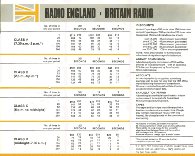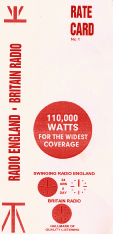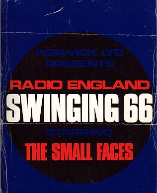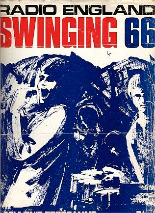© 2014-


Radio England - History (2)
Radio England also brought with it jingles which had been custom made for the station by Promotion and Marketing Services (PAMS) of Dallas, Texas, based on their Series 27 package. These jingles were intended to give the station a clear identity and help to establish it in the increasingly competitive British offshore radio market.
Somewhat naively Radio England played these jingles without voice over interruption from DJs during test transmissions. Most other contemporary offshore stations then recorded the jingles, edited them to include their own identification and then used them during their own programmes before the new station was able to begin regular broadcasts. When it did begin regular transmissions Radio England sounded as though it was using the same jingles as all the other stations and had nothing original of its own, when in fact the reverse was true. To combat this Radio England quickly acquired another jingle package from Spot Communications in Dallas, using the "Batman" theme,(sung as ‘That man’ to avoid copyright infringement). 
Radio En gland's format never really caught on with audiences, advertisers or even its own English DJs. There was constant ill feeling between the English and American staff on board the Laissez Faire -
gland's format never really caught on with audiences, advertisers or even its own English DJs. There was constant ill feeling between the English and American staff on board the Laissez Faire -
This conflict eventually resulted in the 'resignation' of four of the original US "Boss Jocks" in September 1966 after they became totally disillusioned with the operation of the station. Initial commercial contracts were by and large not renewed by dissatisfied advertisers and as a consequence the American backers decided the station was not generating a sufficient return on their investment.
Coupled with this slump in advertising revenue the station mounted a huge nationwide tour -
this slump in advertising revenue the station mounted a huge nationwide tour -
"Swinging 66" was booked to appear at venues (mainly cinemas) across the UK, including towns and cities well outside Radio England's transmission area, - nd and any on-
nd and any on-
The Bill to outlaw offshore broadcasting stations -
The initial reactions from the offshore stations to the Bill were defiant, containing general expressions of determination to fight its introduction and continue broadcasting. Bill Vick of Radio England/Britain Radio said "our ship is American owned and crewed, and the DJs are American. I have already been approached by several continental businessmen about advertising."
By coin cidence on the day of the Bill's publication Radio England/Britain Radio held a champagne party at the Hilton Hotel in London, attended by over 600 guests, including many contemporary pop stars. It was a public relations exercise designed to demonstrate support from the world of show business for offshore radio stations in general, but the hotel’s bill was never paid.
cidence on the day of the Bill's publication Radio England/Britain Radio held a champagne party at the Hilton Hotel in London, attended by over 600 guests, including many contemporary pop stars. It was a public relations exercise designed to demonstrate support from the world of show business for offshore radio stations in general, but the hotel’s bill was never paid.
After some weeks of speculation and rumours an announcement was made on 13th October 1966 that Radio England's frequency was to be leased to a Dutch language broadcaster, initially named as Radio Holland, but this was subsequently changed to Radio Dolfijn.
Radio England had not been the commercial success its American backers had hoped -
Radio England ceased transmissions at midnight on 13th November 1966 and the following day the Dutch language station, Radio Dolfijn took to the air.
Pier Vick Ltd., the managing company behind Radio England (and Britain Radio) was in severe financial difficulties and went into voluntary liquidation in March 1967.

Above Swinging 66 poster
Below the Tour Brochure
Radio England aboard Laissez Faire (Olga Patricia), 1966.
Soundtrack -

Click on picture to enlarge
The advertising Rate Card for Radio England/Britain Radio
Click to enlarge

The Times
21st October 1966
Some of the original Radio England PAMS jingles which were ‘hijacked’ by other offshore stations



Some of the Radio England ‘Batman’ jingles



History
Key Dates
Ship and Location
Technical
Staff
Programmes






Left: a staff pin badge for the party at the Hilton Hotel.
Courtesy Ron O’Quinn
Click image to enlarge
Treasure Chest





Back to Britain Gallery


Back to Radio England
